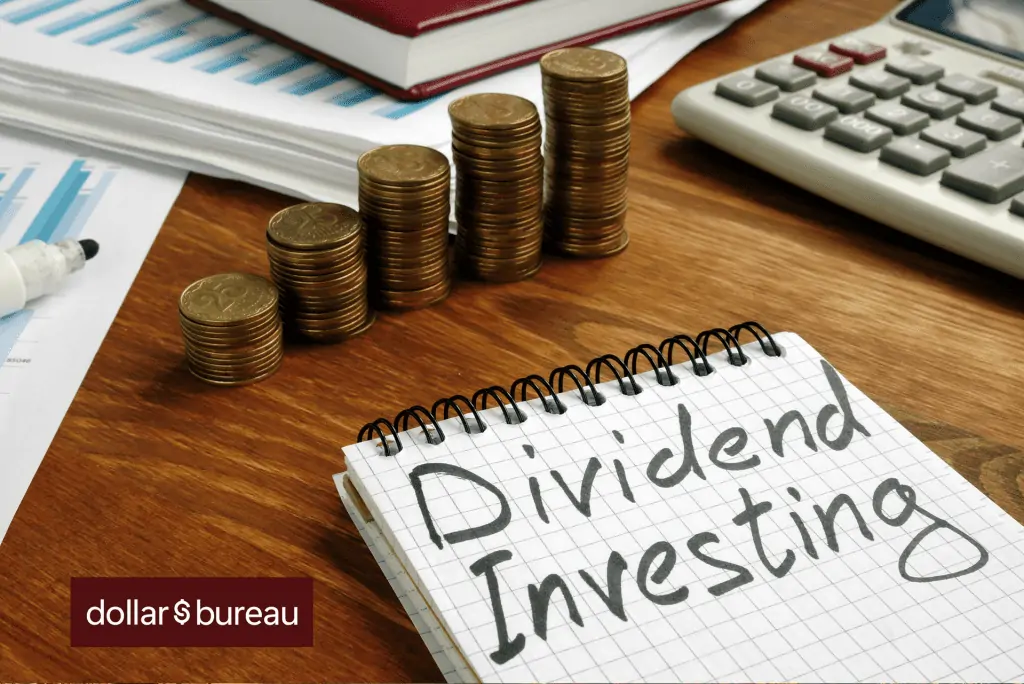What is dividend investing?
How does it differ from other investment strategies?
What are the benefits of dividend investing?
Are these some questions you’re asking yourself?
Dividend investing is very popular in Singapore as we Singaporeans love dividends!
But do you truly understand its pros and cons?
Well, our guide to dividend investing in Singapore is here to help!
First of all, what are dividends?
Dividends are cash payments paid out to shareholders of companies. They’re usually distributed quarterly or annually, depending on the company’s policies.
Dividend investors believe that dividends are a reliable way to generate income over time.
What is dividend investing?
Dividend investing is the practice of buying a stock with the expectation that it pays you with dividend income.
Dividends are payments made by companies to their shareholders out of the earnings they generate after-tax. The amount of the dividend payment depends on how much profit the company has, and what rate it chooses to pay.
Companies can choose to pay either a regular or an extraordinary dividend. Dividends are usually paid every quarter and the specific date might vary depending on the company.
Extraordinary dividends are only paid when the company wants to give you dividends for a special reason.
Advantages of dividend investing
Dividend stocks are stable
Dividend stocks are stable as the price of the shares will not change too much over time. This makes them a good choice if you want a portfolio that’s not volatile.
You don’t have to pay dividend tax
In Singapore, dividends are exempt from tax. So, if you earn any income from dividends, you won’t need to pay any taxes on them.
Read more:
Dividends provide a stable cash flow
When you invest in a dividend-paying stock, you know that your investment will be making money for you. This is especially true even when the market is down as companies will try their best to always pay out dividends.
Disadvantages of dividend investing
There are no guarantees
While there are many benefits to dividend investing, there are also risks involved. Dividend payments are not always stable and might vary depending on the financial year.
So just because you received 7% dividend payouts last year means you’ll receive 7% again in the upcoming year.
It takes time to build up a sizeable investment portfolio
If you’re new to dividend investing, then it may take some time before you start seeing a good amount of income.
It’s common to assume that your annualised returns will be 4%.
To get $1,000 in monthly dividend income, you’ll need $12,000 in dividend income a year.
This means your position needs to be $300,000 to generate this amount monthly!
You will earn little in capital gains
Capital gains are profits generated when you sell a share at a higher price than its purchase price.
The difference between the two prices is known as a capital gain.
As dividend-paying stocks are priced relatively stable, you will see slow growth in your capital.
Dividend Investing vs Growth Investing
Growth investing is about building wealth through the growth in value of your investments. It involves purchasing shares in companies that have the potential to grow in size.
With growth investing, you expect to make money off the capital gains from your investments.
But if you buy into a dividend-paying stock, you expect to see steady dividend income without having to worry about the size of the company.
You also don’t worry too much about capital gains as you would prefer a stock that’s stable.
Read more:
Dividend Investing vs Value Investing
Value investing is all about finding undervalued stocks. You look for businesses with low valuations and high earnings.
These companies tend to have strong fundamentals such as consistent revenue streams and healthy balance sheets.
By looking at the valuation of these companies, you can determine whether the current share prices are undervalued so that you can purchase them at low valuations.
You then make the difference when it reaches its fair valuation or higher.
Read more:
Key Metrics to look at when dividend investing
Payout ratio: A payout ratio shows how much of a company’s net income is being distributed to shareholders. It helps investors understand how much of the company’s profits are used to pay dividends.
Dividend yield: The dividend yield is the percentage of earnings that are returned to shareholders as dividends.
Cash flow: Cash flow is the total amount of cash available to a company. This is important because it tells us whether the company is able to continue paying dividends in future years.
How to choose dividend stocks?
Before you buy into a dividend-paying company, make sure that you do your research first.
Investors should focus on the following factors when choosing dividend-paying companies:
Market cap: Market cap refers to the size of a company relative to other companies in the same industry. Generally, companies with high market caps tend to offer better yields. This is not 100% accurate but provides a good starting point when doing your research.
Return on equity (ROE): ROE measures how efficiently a company uses its capital investments. Higher ROEs mean better performance.
Return on assets (ROA): ROA measures how effectively a company manages its assets. Companies with lower ROAs have less efficient asset management.
Earnings growth rate: Earnings growth rate refers to how fast a company grows its earnings compared to the previous period. High earnings growth rates indicate strong earnings potential.
P/E ratio: P/E ratio compares the price of a company against its earnings. Lower P/E ratios indicate stronger valuations. Should the company has a good P/E ratio and a stable history of paying dividends, it’s a good buy.
Income statement: An income statement provides details about a company’s finances. Investors should check for information such as revenue, profit margins, return on assets, return on equity, and debt levels. Doing so will help them determine if the company can sustainably grow its business and continue paying you dividends.
Balance sheet: Balance sheets provide details about a company’s current assets, liabilities, and equity. They help investors understand how well a company is performing financially. Look for companies with healthy balance sheets.
High volatility: Volatility is the degree of variation or unpredictability in returns. When markets fluctuate, so does the value of a stock. That means you could lose money if you invest in volatile stocks. Dividend investors usually look for stocks with low volatility.
High leverage: Leverage is the use of borrowed money in order for a company to earn more revenue. In general, leverage increases the risk of loss – which in turn puts you at risk of loss too!
High correlation with other assets: Correlation is the extent to which two assets move together over time. Dividends tend to move hand-in-hand with corporate earnings. So when one goes up, the other tends to follow suit. This makes dividend investing risky since it requires you to predict future earnings.
Poor track record: The best way to measure a company’s long-term prospects is by looking at its past performance. While most dividend-paying companies do have strong records, not every company has been able to consistently maintain those results.
Read more:
- 11 Best Blue-Chip Stocks in Singapore: A Comprehensive Guide
- 11 Best Dividend Stocks in Singapore
- 7 Best Dividend ETFs For Singapore Investors to Watch Out For!
Other assets that pay dividends
Other assets you can use for dividend investing is Real Estate Investment Trusts (REITs) and bonds.
REITs are great investment vehicles because they invest in real estate properties. These properties include commercial buildings, apartment complexes, shopping malls, office buildings, industrial parks, hotels, and hospitals.
They also have lower risks compared to traditional equities since their value depends on the property itself rather than shares of stock.
Want to learn more about REITs?
Check out our guide to investing in REITs in Singapore.
As an investor, you only need to worry about one thing – making money from your investments. As long as you know what you’re buying, there shouldn’t be any problems.
Bonds are long-term loans issued by governments or corporations. They are generally regarded as one of the safest ways to store money. Unlike equities, which fluctuate based on the stock exchange, bonds are less volatile and therefore safer.
However, bonds don’t provide dividends per se but they do give you interest payments. You can use these as “dividend” payments if you’re just looking for retirement income from your assets.
This makes it an alternative option for dividend investors if they’re looking to make an additional source of income.
Read more:
- Guide to Bond Investing in Singapore
- Guide to Singapore Savings Bonds (SSBs)
- Guide to Singapore Government Bonds (SGS)
Should I reinvest my dividends?
Yes, you should definitely reinvest your dividends. The reason why is simple – compound interest.
By default, if you bring home 4% of the dividends you earn and don’t reinvest it, you lose out the 4% of potential compounding on those returns.
That means, if you reinvest the 4% you earn, your total returns from capital gain will include the 4% dividends if you reinvested them.
I know, isn’t the point of dividend investing to receive your dividends instead of reinvesting them?
Yes, I agree!
But if for that year you don’t need your dividends, you’re still earning some form of income and don’t need them, or even earnt extra dividends that you don’t need, then reinvesting them will help your investments compound more!
This means that your future self will thank you for reinvesting the additional dividends as you’ll receive more in the long term.
What happens if I’m not able to reinvest my dividends?
That’s okay too. Just keep track of how much you’ve already earnt and start saving again next year.
Keep these dividend earnings and collect them until you have enough to buy another share or ETF of whatever you’re invested in.
Or you can even look into putting them in a robo advisor or regular savings plans if it’s not enough to purchase an entire amount of stock!
If you’re not on Syfe Trade yet, perhaps you can sign up for Syfe and purchase some stocks or ETFs on the US stock exchanges.
Syfe Trade allows you to purchase fractional shares starting from $1, which means you can easily reinvest your money, even if it’s just a small amount!
Click here to receive the latest promotions from Syfe Trade!
Conclusion
I hope this post helped you understand dividend investing in Singapore a little bit better.
Although in many parts of this post I mentioned that dividend investors generally prefer to pick stocks that are not volatile, many still look for stocks with share prices that have the potential to grow and give dividends.
This is because you’d want your investment portfolio to grow in value even without reinvesting your dividends.
That’s because if it doesn’t, your investments will lose value to inflation while you spend away your dividends income.
Do you have the time horizon to accumulate and grow your overall investment portfolio or is passive income without capital gains your goal?
Or are you maybe somewhere in between the spectrum?
Therefore, it ultimately depends on you as an investor.
That’s why many of our readers opt to talk to a financial advisor to find out more about the investment strategies that best suit them, and get their help in investing their money.
If you need help investing, we partner with financial advisors to help you with this.
But if you’re looking to do this on your own, select the best brokerage in Singapore to buy your stocks with and get investing!










